- Home
- John Barth
Giles Goat Boy Page 7
Giles Goat Boy Read online
Page 7
Lady Creamhair I barraged with questions, blunt in themselves and sneeringly put. She told me she had once been Queen-of-the-May; I asked her now about those fairy co-eds whom the old dons-errant had been wont to rescue from the clutch of wicked scientists: Were they younger than she, and comelier? How was it the hero’s costume was given in detail, but never his stud-record? Could a Chancellor’s flaxen-haired daughter, freshened by a strapping young Doctor of Philosophy like those in the Tales, surpass Mary Appenzeller’s output of seventy-three pounds of butterfat in her first year’s milking? If not, what was the ratio of milk-yield to body-weight, say, required to qualify a milch-lady for Advanced Registry? Seven to one? Five? Why did she, Lady Creamhair, not relieve herself every little while as did I and everyone I knew, including Max? If it was, as I suspected, that her exotic diet left nothing to void, why did it not affect me similarly? This boss of hers, whom she compared to a keeper: when had he last arranged to have her serviced; and did he mount her as a rule himself or keep studs for the purpose?
“Young man,” she replied, “those are naughty questions.”
“I’m a goat,” I said.
“Indeed you are, when you ask things just to be unpleasant. I’ve told you already all a boy of fourteen needs to know about marriage and that. As far as the rest—it’s simply not nice to go to the bathroom where people can see.”
This latter wanted some explaining; the ancient narratives had not taught me what bathroom meant, and given its definition I could still not grasp how one “went to the bathroom” out-of-doors, where no bathroom was. When all was finally made clear I ridiculed the queerness of it; danced round her on my knees with my wrapper drawn up to make public my “privates,” as she called them, and gave demonstration of my contempt for human niceness.
“Now look here!” she cried. I mistook her words and left off at once, expecting her to show herself in turn. I was in fact suddenly possessed with curiosity about something that had not occurred to me until that moment. But she made no move to lift her garments. “You can’t expect me to put up with that,” she, said. I flattened myself on the ground to see under her dress; pressed my cheek into the hemlock needles. She was obliged to clutch her skirt about her and move away.
“Very well, Billy, I’m going home.” I saw tears in her eyes, and was instantly contrite.
“I’m sorry! I’m sorry!”
But she was more bothered than I’d imagined. “No, I’m going. I know you’re sorry, but all the same—I think maybe we shan’t see each other again.”
At this I rolled on the ground and wailed so piteously that she could say no more.
“See if I don’t kill myself!” I declared. “I’ll eat privet-berries and die, like Cinnamon Daphie!” In token of my vow I commenced to bang my head on a hemlock root, until she came to my side and begged me to stop.
I paused between bangs. “Will you come again?”
“You don’t understand what the trouble is.” She wiped my eyes and her own. “I’ll have to think what’s right.”
But I could not abide uncertainty. I loved her, I declared: more than I loved Redfearn’s Tommy or Mary Appenzeller; more even than I loved Max. She must promise to see me every day; she must never threaten not to see me.
“Ah Billy!” She hugged me to her chest, and for a time we wept together. “If you knew what you’re saying! Don’t I die when Dr. Spielman calls you home? My own Billikins! Pass All Fail All, don’t I love you?”
Finally it was agreed our tête-a-têtes would be continued—but on a different basis. She’d been on a long vacation, she explained, which being now at end, she must return to work. She would still meet me in the grove on weekend afternoons, and occasionally on weekday evenings while the weather was warm and the days long. The nature of our meetings, too, must be somewhat altered.
“It’s not fair to any of us,” she said. “I want you to be a human being and Dr. Spielman wants you to be a goat, and you’re caught in between. All this secrecy’s not right either. Here’s what I think: you’ve got to be one or the other, and Dr. Spielman and I must go along with your decision.”
It was sweet to roll my head against her chest.
“Why can’t I be both?”
“You just can’t, my dear: if you try to be both, you’ll end up being neither.”
“Then I want to be a man,” I declared—more readily than sincerely, for in truth neither option seemed endurable. The goats still struck me as far superior in almost every respect to the humans I’d seen and heard of: stronger, calmer, nobler; more handsome, more loving, more reliable. But the humans, for better or worse, were vastly more interesting; and what was more, there were no goats in sight.
“No,” she said, “you mustn’t decide so fast. Think hard about it till next Saturday. If you still feel then that you want to be a man, you ought to be raised in a proper house and dress and go to school with the other children. And we’ll have it out with Dr. Spielman; if he disagrees I’ll—I’ll write a letter to the Chancellor about it. But think hard before you make up your mind, Billy. It won’t be easy to catch up; the other boys may laugh at you sometimes, until you learn not to act like a goat—”
My face warmed. “I’ll butt them dead! I’ll kick them with my hooves and tear them into bits and drown them in the creek.”
Creamhair tugged one of my curls. “That’s what I mean.”
I caught myself nibbling on a dandelion and spat it away. “Suppose I want to be a buck like Brickett Ranunculus?”
She looked at me with pity. “You can never be a real buck, Billy. A time will come sooner or later—if it hasn’t already—I can’t explain just what I mean … Oh flunk Max Spielman!” She began weeping again, as she did frequently, and stroked my forehead. “But it’s not for me to criticize him, goodness knows! He did what he thought was best—and who’s to say you wouldn’t’ve been better off if I’d never heard about you?” She blew her nose briskly on one of her tasty tissues. “Well, you are what you are, and you shouldn’t have to be something you don’t like. If you decide to go on living with Dr. Spielman and your friends—which might very well be the best thing—why, then it wouldn’t be right for me to see you any more, because … to me you’ll never be a goat! Do you understand? To me you’ll always be a little boy … who’s been dreadfully mistreated …”
I understood only a part of what she said, but the tenor of it was clear enough. “I do want to be a boy!” I protested, more sincerely now. “I don’t want to go back to the barn at all—except to say goodbye to Mary Appenzeller and Max and Redfearn’s Tommy. I don’t care what Max says. If he says verboten I’ll run away anyhow, and live with you.”
Thus I swore on, in the bliss of her loving demurrers. More, I would have done with goathood then and there: I tried to stand erect, but lost my balance and tumbled over; forgetful of the shame she’d taught me I pulled off my wrapper, deeming it a humaner condition to go about naked than fleeced with angora. Lady C. objected, but not as before; there was more of concern for my rashness than of disapproval in her voice.
“Next weekend is too far off. I want to start now.”
With great reluctance and joy she agreed to come next day for my decision. But I insisted on some radical step away from goathood before we parted: she must shear my curls, or let me wear her sunglasses.
“But I haven’t any scissors in my purse!” she laughed. “And it’s nearly dark; you don’t want sunglasses now.” What she proposed at last—for I would not be put off—was that I wash my face in the stream nearby with a piece of pink soap she had in her bag. I went to it with a fury, howevermuch the strong scent made me sneeze; and didn’t stop at face and neck, but sat hip-deep in the cold creek and lathered my skin from head to foot. Lady Creamhair stood by, protesting my eagerness; she wiped the stinging suds from my eyes, rinsed my hair herself, declared I’d catch my death, and toweled me with her sweater until I glowed. Then she insisted I put on my wrapper and get to the barn before the sun wen
t down. In a stiller pool I regarded the image of my face—its sharp-edged planes, thick curls and gold-fuzzed chin—and thought it good.
“You’ll be a fine man,” she told me when we parted for the day. “My, but doesn’t he smell sweet now, and don’t I love him!” She’d been combing my hair; here she stooped to face me, and I found myself kissed in the mouth.
The shophar sounded. “Bye-bye!” we called to each other, again and again across the fields. My wrapper was stiff and coarse next to my skin. “Bye-bye!” Hordes of blackbirds swept northwestwards; swallows sprang from the barn to dive in the last light. I pursed my lips; I kissed my arms. A queer pain smote me, while the ragged swifts went chittering high up.
5.
Already the lights had come on. The heat in the barn, when I entered, was most oppressive, and I drew back my head at the stench of ammonia rising from the peat-litter. A cry hung in my throat; stung still, I saw through swimming eyes Max hasten toward me.
“What now! What now!”
Frowning alarm, he would embrace me; but his odor, strong as truth, was in my nostrils, and I thrust him off.
“Flunk you! You stink!”
Like two blows of a staff my curse fell on him, drew him up short, and made him sway. Now my heartsgate swooningly let flood an utter lake of pain. “I hate this!”
“Hum!” Max tugged at his beard and fiercely nodded. I rose up to strike him: like a buck well-broken to harness he made no jump away—only watched my fist and flinched in upon himself to take the blow. I hit him on the breastbone; we each fell backwards, sitting hard in the peat. Max laid his hand on the struck place. We sat for some moments, breathing loudly.
Presently I said, “I wish I’d died before I said those things.”
Max shook his head. “What I know, now you wish you didn’t say it.”
I was too empty for tears. “I’m sorry I hit you.”
“I know that.”
“Can you forgive me?” I asked it pretty sullenly.
“Sure I can. But I don’t, sir. Not till it’s good for you.”
A small resentment came then and gave us strength to pick ourselves up from the floor. Bitterly consoled I said, “I see you don’t love me,” and Max was enabled to put his arm across my shoulders.
“Idiot. Too much I love you is what. Forgiveness you don’t ask for like a present; you win it like a prize.”
I believed that then. How sharp the smell of him was. He chuckled at the flare of my nostrils and pressed me to his bucky fleece.
“Ja he hates that stink now, and washed it off him. You said it right, Billy, what that is: that’s the stink of the flunkèd, the stink of the Moishians, and the stink of the goats. Three stinks in one. May you learn to love it one day like the goyim love their Tripos.”
His reference I did not understand, but his manner made us right. We curled up to a meal of oilcake and water—the first food we’d shared in weeks—and when he asked me directly whom I had been seeing that had altered my speech, my opinions, and my scent, I told the full tale of my relations with Lady Creamhair. Max nodded and shook his head, more in sad acknowledgment than in surprise or disapproval. I recounted for him that day’s contretemps, Lady Creamhair’s ultimatum, and my resolve—more grim by now than heartfelt—to leave the herd forever.
“Ach,” Max marveled when I was done, “one day they’re kids, next day they’re stud-bucks. I declare.”
“I’m going to keep my promise,” I said. “It’s all settled.”
Stern pity came in his eyes. “Nothing’s settled, Billy. You don’t know what settled is yet. Never mind settled!” He sniffed and sighed. “So, it’s her or me. Ja, well, I think that’s so.”
I pleaded. “What am I, Max?”
We regarded each other earnestly. Max said, “What you’re going to be I got no idea. But a goat is what you been, and you been happy.”
His words touched my heart. But, I declared, I was happy no longer.
“Who is, but a kid on the teat? You think I was happy when they called me a Student-Unionist and spit in my face? You think the Amaterasus were happy to be EATen alive in the Second Riot? Let me tell you this about unhappiness, Billy: nobody but human people knows what the word means.”
Doubtless Max saw then as clearly as I did later the ruesome enthymeme hanging like an echo in his pause. And how came it he had alluded in the last ten minutes to more mysteries than had perplexed me in as many years? Tripos, Amaterasu, Second Riot—it was most assuredly no lapse, but a change of policy that flung those terms like doleful challenges to my curiosity. With care I considered—I don’t know what—and then respectfully inquired, “What is a Moishian?”
His features softened. “Yes, well. The Moishians is the Chosen Class.”
“Chosen for what?”
His reply was matter-of-fact. “To suffer, dear Billy. Chosen to fail and suffer.”
I pondered these words. “Who chose you to do that?”
Max smiled proudly. “Who’s going to choose you to be a goat or an undergraduate? My boy, we chose ourselves. It’s the Moishians’ best talent: WESCAC puts it on our Aptitude Cards when we matriculate. I’ll tell you one day.”
I understood: he was not putting me off, but clearing way for more pressing inquiries. And though my curiosity was strong, it was no longer pressed. Great doors had quietly been opened; there stretched the wide campus and everything to be learned. But quite so, I had to learn everything, and those doors I felt were open now for good; there was no rush. I felt suddenly exhausted and relieved.
“Well,” I asked him. “Are Moishians the same as goats?”
“Not all goats is Moishians,” he replied with a smile, “but all Moishians is a little bit goat. Of course, there’s goats and goats.”
Now I wanted to know: was I a Moishian?
“Maybe so, maybe not,” Max said. He fetched out his aged penis and declared, “Moishe says in the Old Syllabus, Except ye be circumcised like me, ye shall not Pass. But in the New Syllabus Enos Enoch says Verily, I crave the foreskin of thy mind.”
For a moment I was gripped by my former anguish, and cried out, “I don’t understand anything!”
“That’s a fact. But you will. A little at a time.” He hugged me tenderly and by way of a first lesson explained what, without realizing it, I had really been trying to ask: How had he come to exchange the company of men for that of the goats?
“This Enos Enoch, Billy: ages ago he was the shepherd of the goyim, and I like him okay. He was the Shepherd Emeritus that died for his sheep. But look here: he told his students Ask, and you’ll find the Answer; that’s why the goyim call him their Grand Tutor, and the Founder’s own son. But we Moishians say Ask, and you’ll keep on asking … There’s the difference between us.” And Max said further: “The way the campus works, there’s got to be goats for the sheep to drive out, ja? If they don’t fail us they fail themselves, and then nobody passes. Well I tell you, it’s a hard and passèd fate to be a goat. Enos Enoch, now, he didn’t want them in his herd; he drove out the goats from the fold and set them on his left hand, so he could be a good shepherd to the sheep. Okay, Billy. But when the time came that the goyim drove me out I thought about this: ‘Who’s going to look after the goats?’ And I decided, ‘Max Spielman is.’ ”
“I see why Lady Creamhair didn’t want you to know about her,” I said. “No wonder you hate people.”
But Max denied it. “I don’t even hate the Bonifacists in Siegfrieder College, that burnt up all the Moishians in the Second Riot. What I mean, I hate them a little, because studentkind has got to do some hating, and to hate them for that—it’s a way of loving them, if you think about it. But the ones I really love are the ones the haters hate: I mean the goats.” In a surpassingly gentle voice he observed: “Tonight you came home full of joy that you were a man instead of a goat, hey? And the first thing you said was Flunk you, and the second was I hate …” He sighed. “That’s why I came to the goats.”
I hun
g my head. Now it was Lady Creamhair I despised, and the heartless alacrity with which I had struck down what was most precious to me. Yet alas: hating her, I recognized my hateful humanness, and then but hated myself the more. Thus mired and bound I groaned aloud: nothing is loathsomer than the self-loathing of a self one loathes.
“I don’t want to be a man!” I cried. “I don’t know what I want!”
“Bah, you want to grow up,” my keeper said. “That’s what’s at the bottom of it. And you will, one way or the other.”
I told him I had sworn to let Lady Creamhair know tomorrow of my decision.
“Let me know too,” Max grunted, and lay down for the night.
Sweet sleep: it was a boon denied me. Long after Max had set to snoring I tossed in my corner, remembering his words and reimagining Creamhair’s kiss. Anon I was driven to embrace Redfearn’s Tommy in his stall; but he was alarmed by the strange scent on me (which my own nose, fickle as its owner, had long since lost hold of), and warned me to keep my distance. I let him be and went next door to the doe pens, envious and smarting. There too my presence caused a stir, but Mary V. Appenzeller knew me under any false fragrance; she and a pretty young Saanen named Hedda, that had been my good friend some seasons past, bleated uneasily when I hugged them, but lay still against each other in a corner and suffered me to turn and return in the good oils of their fleece. Thus anointed, I struck out into the pasture, meaning to bathe my restlessness in night-dew, and there came upon the two human lovers I mentioned before.

 Final Fridays
Final Fridays Where Three Roads Meet: Novellas
Where Three Roads Meet: Novellas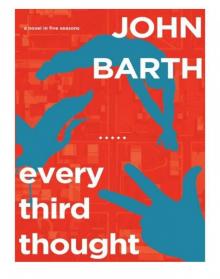 Every Third Thought: A Novel in Five Seasons
Every Third Thought: A Novel in Five Seasons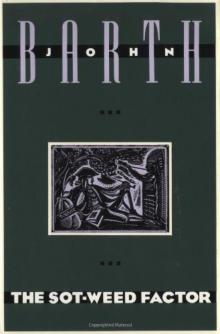 The Sot-Weed Factor
The Sot-Weed Factor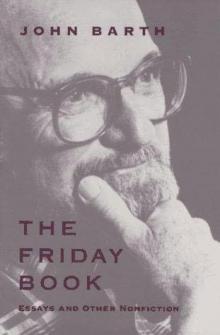 The Friday Book
The Friday Book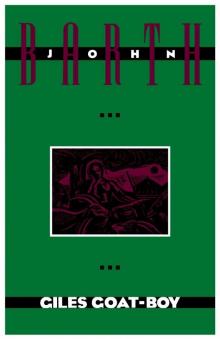 Giles Goat Boy
Giles Goat Boy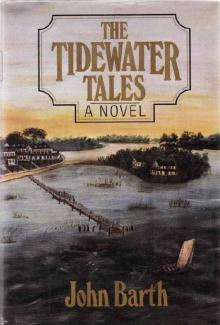 The Tidewater Tales
The Tidewater Tales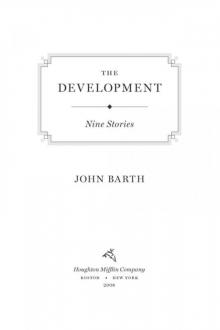 The Development
The Development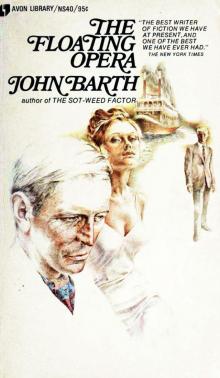 The Floating Opera
The Floating Opera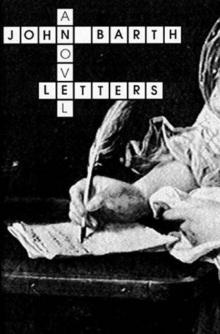 Letters
Letters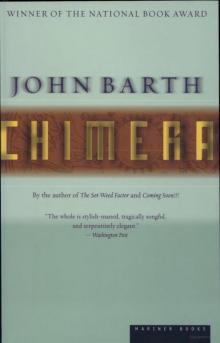 Chimera
Chimera Where Three Roads Meet
Where Three Roads Meet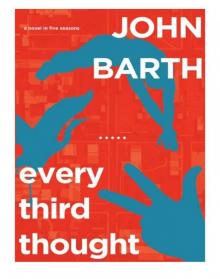 Every Third Thought
Every Third Thought